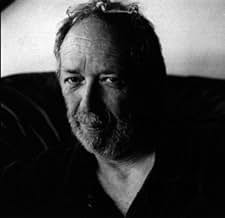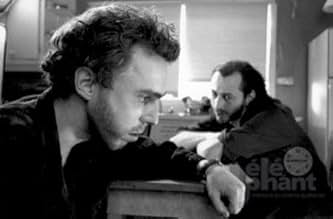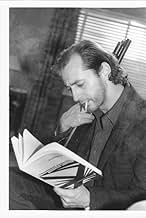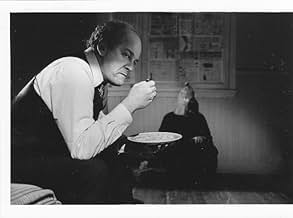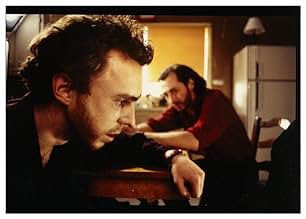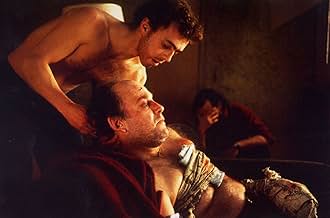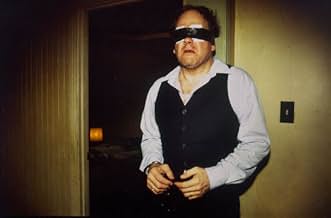Agrega una trama en tu idiomaA dramatization of the infamous Canadian terrorist abduction & murder of a government minister by a cell of The Quebec Liberation Front.A dramatization of the infamous Canadian terrorist abduction & murder of a government minister by a cell of The Quebec Liberation Front.A dramatization of the infamous Canadian terrorist abduction & murder of a government minister by a cell of The Quebec Liberation Front.
- Dirección
- Guionistas
- Elenco
Hugolin Chevrette-Landesque
- Neveu
- (as Hugo C. Landesque)
- Dirección
- Guionistas
- Todo el elenco y el equipo
- Producción, taquilla y más en IMDbPro
Opiniones destacadas
First off this movie as to be taken for what it is worth - A historical reconstruction of what might of happen to the four men who kidnapped Pierre Laporte, Ministère du Travail in the cabinet of Robert Bourassa's provincial liberal government in Quebec.
Once that this is taken into consideration, the movie can really be enjoyed. It really differs from any political statements or supposedly "objective" journalist piece on this unforgivable event. What Pierre Falardeau was going for here was to demonstrate the psychological nightmare that these five men went through during that ordeal. This movie is not a historical reconstruction of the events of the October Crisis, and although Falardeau - a personal friend of Francis Simard, one of the kidnappers- is a well-known supporter of Quebec's independence movement, he does not glorify at all what these men did - nor does he criticize it. That's what makes the beauty of this film: Its neutrality in the portrayal of the ordeal. The ordeal is not presented politically, economically, and socially; it is presented in a confined, at times claustrophobic atmosphere. And again, it is about the men involved and how unbearable it must have been in that house. And that fact, i feel is extremely well demonstrated.
Most, if not all, of the movies or documentaries on this event are obviously subjective. The goal of this film is to try and make your feel what dose people must have felt- and that is a very interesting and refreshing take on the event.
Once that this is taken into consideration, the movie can really be enjoyed. It really differs from any political statements or supposedly "objective" journalist piece on this unforgivable event. What Pierre Falardeau was going for here was to demonstrate the psychological nightmare that these five men went through during that ordeal. This movie is not a historical reconstruction of the events of the October Crisis, and although Falardeau - a personal friend of Francis Simard, one of the kidnappers- is a well-known supporter of Quebec's independence movement, he does not glorify at all what these men did - nor does he criticize it. That's what makes the beauty of this film: Its neutrality in the portrayal of the ordeal. The ordeal is not presented politically, economically, and socially; it is presented in a confined, at times claustrophobic atmosphere. And again, it is about the men involved and how unbearable it must have been in that house. And that fact, i feel is extremely well demonstrated.
Most, if not all, of the movies or documentaries on this event are obviously subjective. The goal of this film is to try and make your feel what dose people must have felt- and that is a very interesting and refreshing take on the event.
In regards to previous comments, a few things need to be said. First, this movie is not a documentary and it doesn't have the pretension to be one. So I think you need to keep this in mind, and not expect to hear experts come to the camera and give «neutral» and «objective» clarification.
Second, the movie is based on a book written by one of the felquiste. So it would be incorrect to jump to the other extreme and say that the story is «fictionalized». The book, as well as the movie, is written in plain honesty, many years after the events that took place in 1970.
Keeping in mind that the movie depicts the events as seen through the eyes of one of the perpertrators, the movie is extremely effective in showing how Ideals can grasp people, how revolutions (often failed) occur, what it means to believe in something with all your heart. It also shows, and you must be blind not to see this, how events like these might as well take a proportion that was not intended, and that playing with the lives of individuals is not as easy as it might seem in the first place.
Octobre shows the real meaning of politics, of a political event, of a revolution. It shows that political events are never totally black or white.
You might say that because Falardeau is a separatist he doesn't give a neutral or objective point of view, and thus, the movie is biased. I'll be ready to accept this critique when somebody shows me a way to depict such an event in a neutral and objective way. A lot of people won't be able to appreciate Octobre for two possible reasons : a) they lack the necessary background to understand the story, or b) they view the movie as another absurd propaganda from separatists.
Other than that, Falardeau renders very well the tension that builds inside the small house where five people are stuck, waiting for the government to negotiate. It is a very emotional movie ; I saw the movie in Montréal when it came out. There weren't many people in the movie theatre. When the movie ended, I stood up to leave and noticed two older people, a man and a woman. Both we're still looking at the blank screen, silent. I thought that they were probably involved in the FLQ, that they were probably arrested also. Watching this movie must have been very difficult for them, at least this is what their eyes told me.
Second, the movie is based on a book written by one of the felquiste. So it would be incorrect to jump to the other extreme and say that the story is «fictionalized». The book, as well as the movie, is written in plain honesty, many years after the events that took place in 1970.
Keeping in mind that the movie depicts the events as seen through the eyes of one of the perpertrators, the movie is extremely effective in showing how Ideals can grasp people, how revolutions (often failed) occur, what it means to believe in something with all your heart. It also shows, and you must be blind not to see this, how events like these might as well take a proportion that was not intended, and that playing with the lives of individuals is not as easy as it might seem in the first place.
Octobre shows the real meaning of politics, of a political event, of a revolution. It shows that political events are never totally black or white.
You might say that because Falardeau is a separatist he doesn't give a neutral or objective point of view, and thus, the movie is biased. I'll be ready to accept this critique when somebody shows me a way to depict such an event in a neutral and objective way. A lot of people won't be able to appreciate Octobre for two possible reasons : a) they lack the necessary background to understand the story, or b) they view the movie as another absurd propaganda from separatists.
Other than that, Falardeau renders very well the tension that builds inside the small house where five people are stuck, waiting for the government to negotiate. It is a very emotional movie ; I saw the movie in Montréal when it came out. There weren't many people in the movie theatre. When the movie ended, I stood up to leave and noticed two older people, a man and a woman. Both we're still looking at the blank screen, silent. I thought that they were probably involved in the FLQ, that they were probably arrested also. Watching this movie must have been very difficult for them, at least this is what their eyes told me.
8N.L.
I saw this film shortly after it was released as part of a "sneak peak" series in Philadelphia. Not a single member (including me) of the otherwise well-read and educated audience knew anything about the historical events depicted in the film. This was embarrassing to say the least! In the discussion afterward, it was obvious that the audience universally appreciated the film, but it was also apparent that it would be a hard sell to U.S. ticket-buyers. So it became no surprise that it was not picked up for U.S. distribution. Because of woeful ignorance of most-things-Canadian that exists south of the border - and god forbid! subtitles - OCTOBRE vanished from our radar in the U.S.
Again, Falardeau has put his camera where it hurts, where a camera should be ! A lot where fearing a radical, simplistic view of the events of October 1970, but were surprised to witness that the director's take on the FLQ's actions were concentrated mostly on the human aspect. These men were not brainwashed activists or militarily trained supermen, they were Quebec workers, french speaking working class citizens who got fed up with oppression and decided to wake up a nation. But by doing so, one soon realizes that he has to be willing to give up everything for the cause. These guys were not super heroes, they were not mindless protesters; they doubted, they feared, they hoped, they laughed, they cried, they hurt each other, they despaired...they were and are human beings. Real human beings. And that's what interested Falardeau. Ordinary people taking extraordinary measures to shake a system that doesn't want to listen to them. But they found themselves in a dead end once the government decide to send in the army instead of negotiating. If they would have let the hostage go, they're whole operation would have seemed as a farce and the demands of Quebec would once again not be taken seriously. But as they say in the film, they were not murderers. They were faced with a dilemma: go all the way or be forever sheep in a country that does not even recognize the existence of their nation. You can feel all the pressure of that dilemma in "Octobre". And to me, that is the main reason for the film's being. It is not simplistic. It does not evacuate the moral issues of the actions taken by the protagonist. It shows the other side of a revolution, the human difficulties that go with it. And that is no minor task. For once, in Quebec, we were told a story from a non-institutional point of view. And only this, to start with, makes "Octobre" essential viewing.
As a movie, Octobre is not very interesting, except maybe for Quebeckers that might want to renew with a part of their past, in a fictionalized way.
As a documentary, Octobre is totally wrong, showing us just one biased side of the story, failing to describe the reality.
The felquists are well played by the lead actors but the story is not very inspiring. After kidnaping the minister of Labor, Pierre Laporte, they wait for the government to negotiate with them. They want the independence of Québec.
Falardeau, himself in favor of independence from Canada, presents the felquists as heros, good guys that needed to do what they've done, for the «cause». While in fact, these guys are just fanatics that read a little too much books about the Revolution. They had the arrogance to think that they were talking for everybody else, that Quebeckers were a 100% behind them.
So it goes on! They kidnaped the minister but they treat him like a friend. Maybe a little bit more water, monsieur le ministre! We're sorry we have to do that! They even give a good tip to the delivery guy! I think it's a manipulative way for Falardeau to present the felquists as martyrs of the independence. And one of the felquists to say: «If we didn't had heart, we wouldn't be here today»...
As all terrorists, the felquists in this movie had an utopian idea of the country where they wanted to live. They were sure about one thing: they were right. And Falardeau, by making this movie, wants us to have sympathy for those guys. Well, sorry Mr Falardeau, but I think your movie may appeals to some independists from Québec, but no more. Cause, once again, as a movie, it's not that good, and as a documentary, it's just propaganda.
Because of the acting, I gave this movie 73 out of 100. That's good for **½ on a **** stars rating system.
Seen at home in Welland, on January 29th, 2002.
As a documentary, Octobre is totally wrong, showing us just one biased side of the story, failing to describe the reality.
The felquists are well played by the lead actors but the story is not very inspiring. After kidnaping the minister of Labor, Pierre Laporte, they wait for the government to negotiate with them. They want the independence of Québec.
Falardeau, himself in favor of independence from Canada, presents the felquists as heros, good guys that needed to do what they've done, for the «cause». While in fact, these guys are just fanatics that read a little too much books about the Revolution. They had the arrogance to think that they were talking for everybody else, that Quebeckers were a 100% behind them.
So it goes on! They kidnaped the minister but they treat him like a friend. Maybe a little bit more water, monsieur le ministre! We're sorry we have to do that! They even give a good tip to the delivery guy! I think it's a manipulative way for Falardeau to present the felquists as martyrs of the independence. And one of the felquists to say: «If we didn't had heart, we wouldn't be here today»...
As all terrorists, the felquists in this movie had an utopian idea of the country where they wanted to live. They were sure about one thing: they were right. And Falardeau, by making this movie, wants us to have sympathy for those guys. Well, sorry Mr Falardeau, but I think your movie may appeals to some independists from Québec, but no more. Cause, once again, as a movie, it's not that good, and as a documentary, it's just propaganda.
Because of the acting, I gave this movie 73 out of 100. That's good for **½ on a **** stars rating system.
Seen at home in Welland, on January 29th, 2002.
¿Sabías que…?
- TriviaPierre Falardeau: The homeless man up the stairs in the second subway station scene.
- ConexionesEdited into Black October (2000)
Selecciones populares
Inicia sesión para calificar y agrega a la lista de videos para obtener recomendaciones personalizadas
Detalles
- Fecha de lanzamiento
- País de origen
- Sitio oficial
- Idiomas
- También se conoce como
- Outubro Violento
- Locaciones de filmación
- Productoras
- Ver más créditos de la compañía en IMDbPro
Taquilla
- Total en EE. UU. y Canadá
- USD 349,633
Contribuir a esta página
Sugiere una edición o agrega el contenido que falta

Principales brechas de datos
By what name was Octobre (1994) officially released in Canada in English?
Responda
